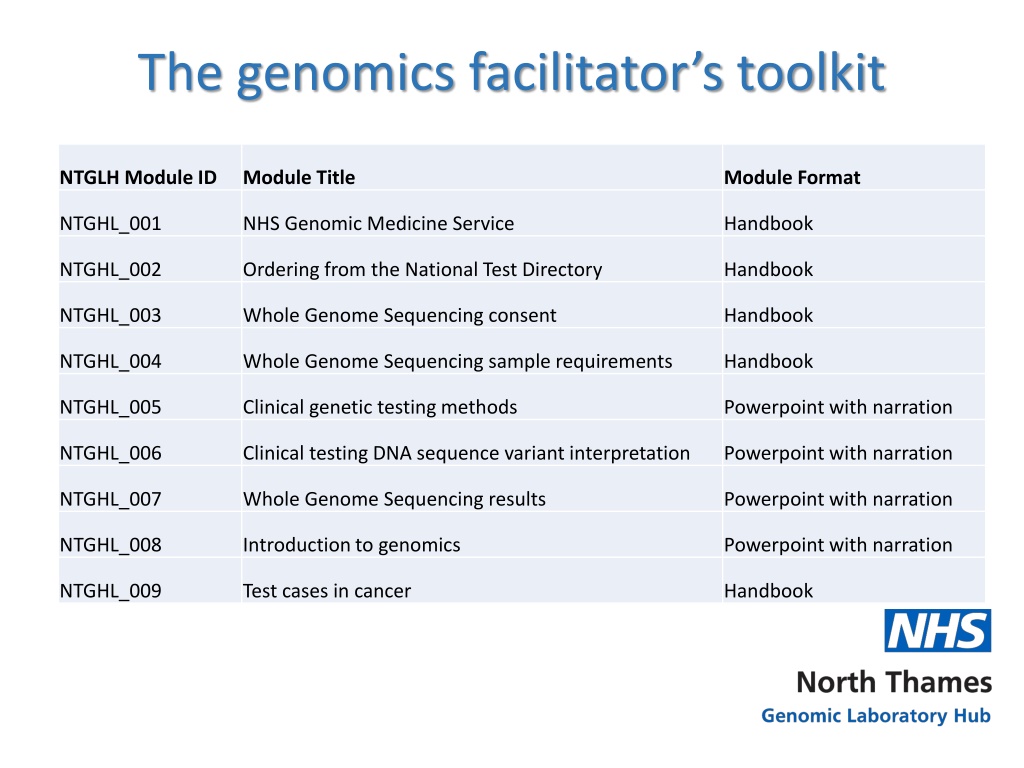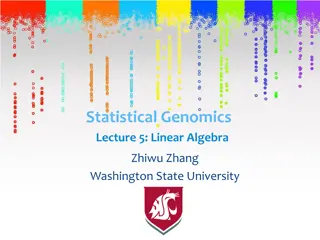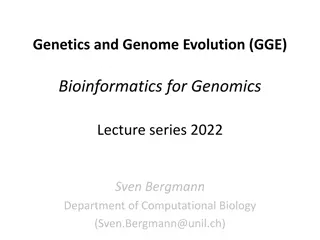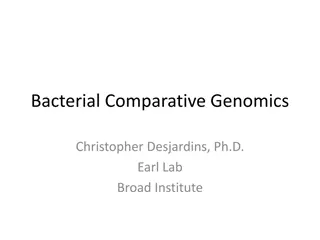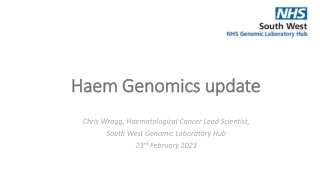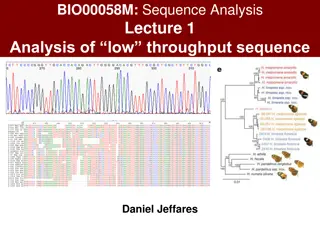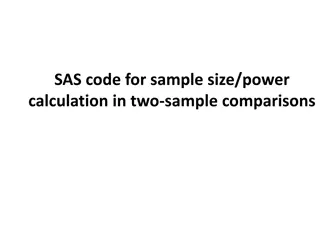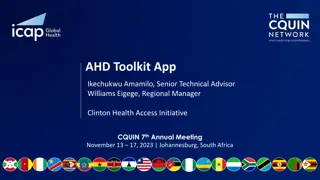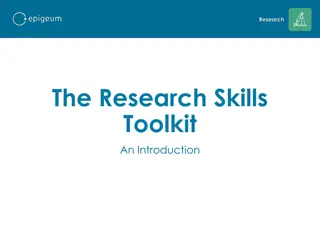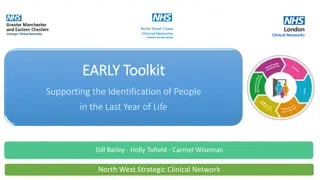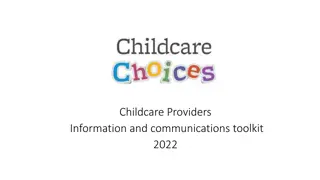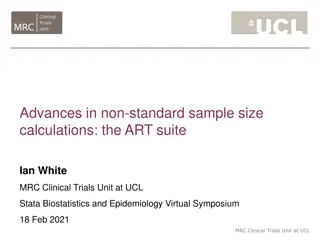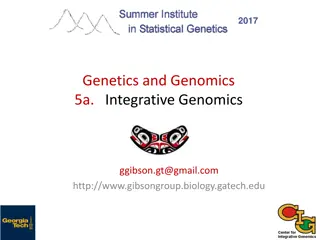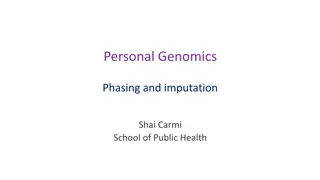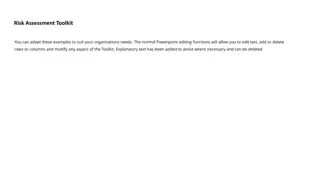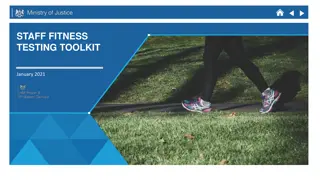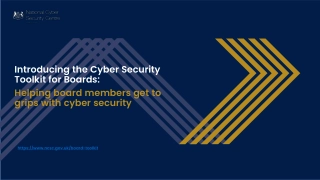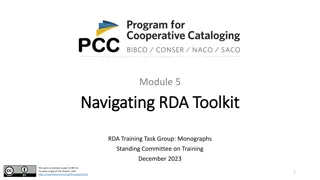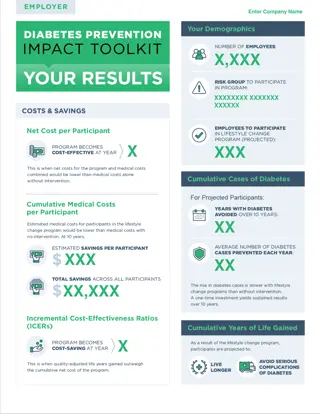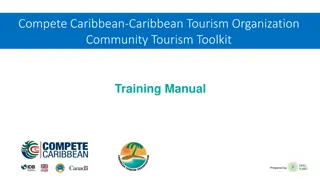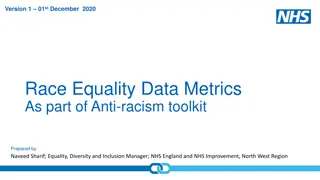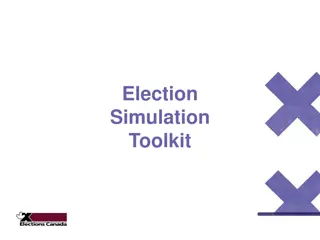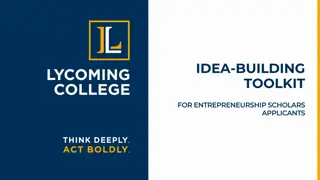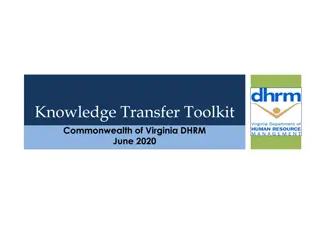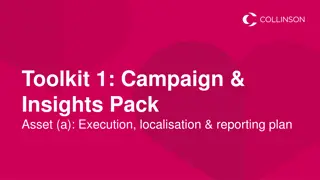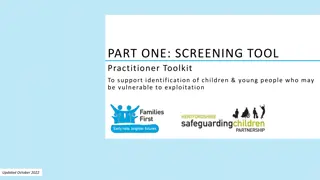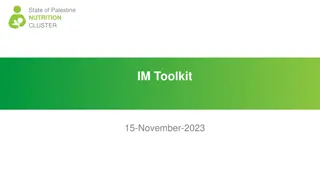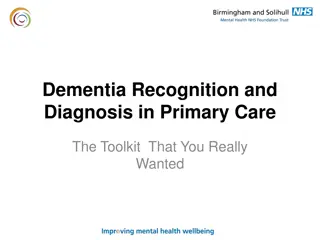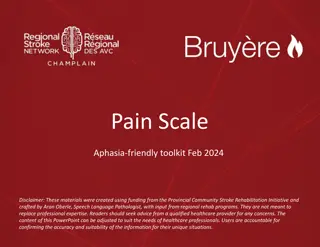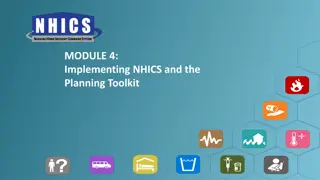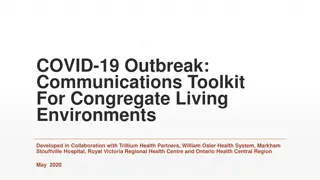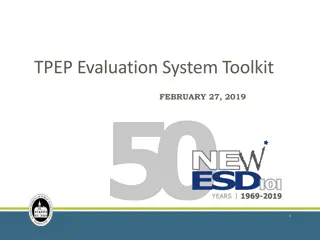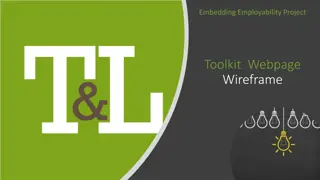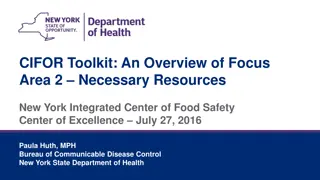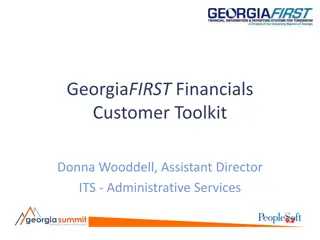Genomics Facilitator's Toolkit Summary & Sample Requirements
This toolkit provides essential resources for healthcare professionals involved in genomics services, covering topics such as genomic medicine, whole genome sequencing, clinical genetic testing methods, interpretation of DNA variants, and more. It also details the specific sample requirements for different applications such as germline, rare diseases, cancer, and tumor samples in both solid tumors and hematologic malignancies. Guidance documents and sample sequencing instructions are included to ensure the appropriate handling and sequencing of samples for accurate genomic analysis.
Download Presentation

Please find below an Image/Link to download the presentation.
The content on the website is provided AS IS for your information and personal use only. It may not be sold, licensed, or shared on other websites without obtaining consent from the author. Download presentation by click this link. If you encounter any issues during the download, it is possible that the publisher has removed the file from their server.
E N D
Presentation Transcript
The genomics facilitators toolkit NTGLH Module ID Module Title Module Format NTGHL_001 NHS Genomic Medicine Service Handbook NTGHL_002 Ordering from the National Test Directory Handbook NTGHL_003 Whole Genome Sequencing consent Handbook NTGHL_004 Whole Genome Sequencing sample requirements Handbook NTGHL_005 Clinical genetic testing methods Powerpoint with narration NTGHL_006 Clinical testing DNA sequence variant interpretation Powerpoint with narration NTGHL_007 Whole Genome Sequencing results Powerpoint with narration NTGHL_008 Introduction to genomics Powerpoint with narration NTGHL_009 Test cases in cancer Handbook
NTGLH_004 Whole genome sequencing (WGS) sample requirements Information for healthcare professionals
Contents Guidance documents WGS sample requirements Sample requirements - germline Minimum blood volume requirements for germline WGS Sample requirements - rare disease (RD) Sample requirements - RD germline Sample requirements - cancer Sample requirements - cancer germline Tumour sample requirements Sample requirements - solid tumours Sample requirements - haemonc. tumours Sample prioritisation Sample uses Sample pathways Advice and educational resources Contacts and information NTGLH004 WGS sample requirements
Guidance documents Four whole genome sequencing sample guidance documents have been published by NHS England for the Genomic Medicine Service, please refer to and/or ask your local GLH test provider for: 1. Sample Sequencing for Germline Samples Sample Handling Sequencing of Solid Tumour Samples Sample Handling Sequencing of Haematological Malignancies for Adults, Children and Young People DNA Extraction and Quality Control Guidance for Whole Genome Sequencing. Handling Guidance for Whole Genome 2. Guidance for Whole Genome 3. Guidance for Whole Genome 4. NTGLH004 WGS sample requirements
WGS sample requirements Tumour: acquired/somatic Whole body: germline/constitutional Cancer only: sourced from tumour sample Rare disease and cancer: sourced from blood or tissue Rare disease and cancer germline samples, including all solid and liquid tumours, to be extracted by NTGLH are extracted at GOSH. NTGLH004 WGS sample requirements
WGS sample requirements NTGLH004 WGS sample requirements
Sample requirements - germline Germline DNA for WGS (and other genomic tests) are sourced from: 1. Ideally a peripheral blood sample or alternatively sample 2. Saliva meeting certain criteria 3. Fibroblast-derived DNA 4. Uncultured skin biopsy 5. Bone marrow aspirate meeting certain criteria. Refer to guidance for BMT or transfusion patients NHS England s, Sample Handling Guidance for Whole Genome Sequencing of Haematological Malignancies for Adults, Children and Young People. NTGLH004 WGS sample requirements
Sample requirements - germline 1. Peripheral blood collected in an EDTA tube 2. Saliva - only in exceptional circumstances, according to kit guidelines 3. Cultured fibroblasts that must be collected, processed and stored according to local best practice and within a laboratory with UKAS ISO 15189:2012 accreditation for this process 4. Uncultured skin biopsy - 4mm punch biopsy 5. Bone marrow - tumour dependent 6. Stored DNA* *Use of stored DNA must meet certain criteria, refer to NHS England WGS sampling handling guidance NTGLH004 WGS sample requirements
Sample requirements - germline To ensure successful WGS, a minimum amount of 2 g of DNA should be provided. This DNA requirement is sufficient for QC, WGS and potential future analysis In exceptional circumstances only where limited sample is obtained, a minimum of 1 g of DNA can be submitted, but this will increase the likelihood of sample quality control (QC) failure A further 5 g is recommended to be retained locally for follow-up if required. NTGLH004 WGS sample requirements
Minimum blood volume requirements for germline WGS In neonates, acutely ill children and other patients where venepuncture is challenging, clinical discretion should be applied to the volume of blood drawn. Age EDTA DNA 14 years+ 3-5 ml x2 3-14 years > 3ml x 2 0-3 years 1-3 ml NTGLH004 WGS sample requirements
Sample requirements - rare disease (RD) Only a germline sample is required Where relevant sample from family members If relevant family members are not present in the initial consultation, consent and samples may need to be arranged separately The GLH will not send samples for sequencing until samples from all required members of the family (as noted on the WGS test order form) have been received. NTGLH004 WGS sample requirements
Sample requirements - RD germline NTGLH004 WGS sample requirements
Sample requirements - cancer A tumour/normal matched pair is required for WGS to go ahead For patients who have had a bone marrow transplant, a germline DNA sample would need to be acquired from fibroblasts, other unaffected tissue, or from a germline sample stored before the patient s transplant It can be more difficult to extract, sequence and obtain a high-quality result from DNA extracted from cancer cells of a solid tumour. Patients should be aware of the potential risk of sample failure and no results being obtained to provide information about their cancer Conversely, for haematological malignancies (such as leukaemias), it can be more challenging to obtain a high-quality and uncontaminated germline sample NTGLH004 WGS sample requirements
Sample requirements - cancer germline Plating GLH requirements Specification to be met by Home GLH WGS provider requirements Measurement Notes Standard input DNA concentration 20-100ng/ l 45ng/ l is preferred Minimum 115 l 115-125 l preferred Sample volume Minimum 100 l 105-125 l preferred The Plating GLH will store the volume retained in the FluidX tubes post plating into 96-well plates therefore the required volume is larger than the volume required by the WGS provider. Accurate measurement of the volume submitted is required. The volume must be >100 l to pass QC at WGS provider. Applies to: Tumour DNA extracted from Fresh Frozen tissue samples Tumour DNA extracted from haematological malignancy patients Matched Germline DNA for haematological malignancies Quantify using a validated double stranded DNA quantification method e.g. Qubit. Spectrophotometers such as Nanodrop cannot be used for DNA quantification. DNA Quantification Minimum of 2 g DNA Purity Assessment In the event of limited DNA availability, a reduced volume/amount of DNA can be submitted on the understanding that only a single WGS attempt will be possible. Please note that GLHs must endeavour to meet the specification aboveand only submit through this route if absolutely necessary. Low volume input DNA concentration 20-100ng/ l 45ng/ l is preferred A260/A280 ratio must be 1.75 - 2.04 The DNA concentration requirements remain the same for submission of low volume samples. The Plating GLH will store the volume retained in the FluidX tubes post plating into 96-well plates therefore the required volume is larger than the volume required by the WGS provider. Accurate measurement of the volume submitted is required. The volume must be >60 l to pass QC at WGS provider. Quantify using a validated double stranded DNA quantification method e.g. Qubit. Spectrophotometers such as Nanodrop cannot be used for DNA quantification. Sample volume Minimum 60 l 60-99 l preferred Minimum 50 l 55-99 l preferred DNA Quantification Submission of 1 g is acceptable for a single WGS attempt. Submission of any sample <1 g will continue to WGS and every reasonable effort will be made to WGS the sample and obtain an informative result with the understanding that full sequencing coverage of high quality may not be achievable. The volumes stated above MUST be met regardless of concentration. A260/A280 ratio must be 1.75 - 2.04 DNA Purity Assessment NTGLH004 WGS sample requirements
Tumour sample requirements Specific guidance on selecting, sampling and storing tumour tissue for WGS is available. Content Tumour Assessment: For solid tumour invasive malignant nuclei must account for at least 30% of the nuclei present in the tissue sample submitted for WGS. Additionally, the sample should have less than 20% necrosis by area. Specific guidance has been issued on haematological malignancies e.g. for AML, blood containing >=20% blasts morphologically or any blast percentage if there is an AML-defining genetic abnormality. Tumour sampling techniques: https://www.genomicsengland.co.uk/about-genomics-england/the- 100000-genomes-project/information-for-gmc-staff/cancer- programme/pathology-in-the-nhs/ NTGLH004 WGS sample requirements
Sample requirements - solid tumours NTGLH004 WGS sample requirements
Sample prioritisation Until WGS bioinformatics pipelines are fully validated and results can be returned in an appropriate time frame, it will be necessary to run the assay in parallel with current standard of care testing (SOC). Consequently, there will be occasions when there will not be sufficient material for all indicated tests. In this scenario priority should be given to those tests that will inform immediate management at the discretion of the treating clinician. NTGLH004 WGS sample requirements
Sample uses Testing: The GLH WGS DNA extraction laboratory will carry out checks to ensure quality of the samples. The laboratory for the WGS test request that has been raised, will await samples from all family members, tumour/normal matched pair, prior to sending them for sequencing. A GLH WGS test provider will make contact if there are any issues with samples when they arrive at the laboratory, or if potential errors are identified at the time of sequencing or analysis. NTGLH004 WGS sample requirements
Sample uses Storage: DNA samples are stored in the local GLH and can be accessed by other laboratories within the GMS. Tumour samples may also be stored in the local hospital histopathology unit. Stored samples can be used: 1. In the future for further genomic tests provided appropriate consent has been obtained 2. As a control sample when testing family members of a proband 3. To help with laboratory test development and quality control procedures, although they are de-identified for this use. The laboratory will notify the clinician if there is a limited remaining amount of sample (for instance, if an individual is deceased) so a decision can be made on how it can be used. NTGLH004 WGS sample requirements
Sample pathway for rare and inherited diseases NTGLH004 WGS sample requirements
Sample pathway - haematological malignancies NTGLH004 WGS sample requirements
Advice and educational resources North Thames Genomic Laboratory Hub Follow us: @NorthThamesGLH Contact us at: gos-tr.norththamesglh@nhs.net Further education https://www.genomicseducation.hee.nhs.uk/ Free online course -5 weeks, 2 hours per week https://www.genome.gov/about-genomics/fact-sheets https://www.futurelearn.com/courses/the-genomics-era https://geneticsunzipped.com/blog/2019/3/4/008-getting- ready-for-genomic-medicine
Contacts and information Primary author: Shazia Mahamdallie, Scientist, GOSH Content of slides have been adapted from NHS England WGS sample handing guidance, see document list on slide 4. For any queries please contact: North Thames GLH Education & Training Lead: Corinne Trim corinne.trim@gosh.nhs.uk Francesca Faravelli, Consultant Clinical Geneticist Francesca.Faravelli@gosh.nhs.uk
